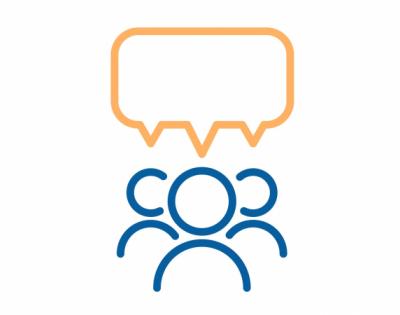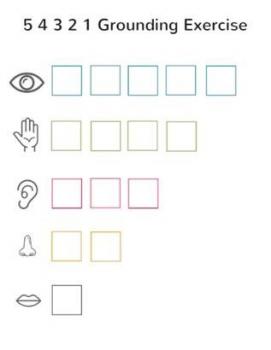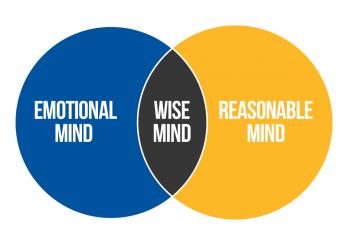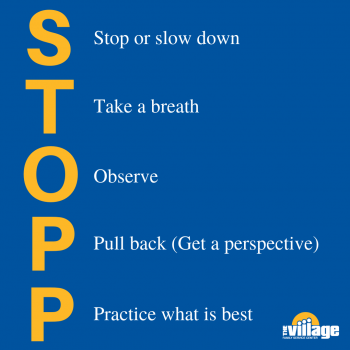
Sometimes in life, we hear just the right piece of advice at just the right moment. In honor of Mental Health Month, celebrated every May, therapists, counselors, and mental health practitioners from The Village Family Service Center shared their favorite mental health tips, mantras, and bits of wisdom that clients have said helped them to change their thinking and move forward.
Hopefully these ideas can help you find a different way to think about a situation or to cope better during a difficult time. Remember, with The Village, you don't have to go it alone.
Mental Health Tips & Tricks
Be Glad
G.L.A.D. Daily Snapshots is a technique that I use with teenagers and parents who struggle with everyday issues that can consume them. It helps them think more positively. Many of us think that if the day started out badly, then the rest of the day will bring more unhappiness. Sometimes we let this negative mindset consume our confidence. This acronym is used to find joy by paying attention to the life around us in a more positive and self aware way.

This help breaks up the negative and self-defeating thinking patterns by pushing us to think in a more positive mindset. Sometimes I have clients put a smiley face on their mirror, in their car, at work, or in their purse or backpack to remind themselves to think positively and use the acronym GLAD.
Practice Gratitude
If you practice gratitude each day by thinking of three things you’re grateful for, it will literally re-wire your brain to be happier. That’s a pretty small change to make for such a big impact!
Set Goals
It is important to set realistic and reachable goals for yourself. Set a goal every morning when you get out of bed, a goal that you can accomplish that day. Reachable goals are so important because you will feel proud of yourself for accomplishing them and this will keep you motivated to continue working towards improvements. Seeing and experiencing success within ourselves keeps us motivated to continually improve.
Accept Yourself
The goal is not to rid yourself of anxiety or depression, the goal is to accept that you are experiencing anxiety or depression and learn effective coping techniques to manage it in a healthy way. Accept the anxiety or depression is there, recognize it and take the road to cope with it through healthy coping techniques.
Use Tools to Organize
Imagine that you are carrying around a suitcase with you, and everything is unfolded. The socks are not folded, shirts are thrown in the suitcase, everything is falling out. This is often what untreated mental health can feel like. It can feel unorganized and confusing. When we seek therapy and treat our mental health effectively we put tools in our toolbox that we carry with us. The suitcase does not go away, but we fold the socks and T-shirts, we now carry our suitcase with us in an organized, integrated way. This is why seeking therapy and guidance for mental health is so important.
Ground Yourself
Many clients, children to adults, have found the ground skill 5,4,3,2,1 very helpful when feeling overwhelmed whether with large emotions or racing thoughts. 5,4,3,2,1 comes from 5 things we see, 4 things we can touch, 3 things we can hear, 2 things we can smell, and 1 thing we taste.

Don't Believe Everything You Think
Two simple yet powerful sayings: 1. Thoughts are NOT facts. 2. If we give the mental health problem (anxiety, depression) attention, it will hear and respond to our efforts (creating change).
Realize You Are Not Broken
A former client came in to learn how to cope with feelings of loneliness. After five sessions, the client stated that she realized that she is not broken, has never been broken, and that there is nothing wrong with her – even before she started therapy. She has realized just through engaging in self-reflection and learning to accept things as they are now, she has become a happier person and wanting to engage with others around her. She stated that she recognizes that her situation has not changed, but that her perspective has, and that has made all the difference in helping her see that others do care about her and take an interest in her, which has increased her connecting with others around her.
Focus On The Here and Now
One therapist utilizing the idea of focusing on the here and now and figuring out what you can control in the situation. A lot of times, people will focus on the past regarding decisions made and the future and what could possibly happen. This can lead to a lot of anxieties, fears, and depressive symptoms. Practicing mindfulness techniques to assist with focusing on the here and now can help assist in reducing anxious, depressive, and fearful symptoms.
Take A Time-Out
One recommendation often given to clients is to take a time-out when they are angry. There is a reason for this. When our heart rate goes above 95 bpm, our IQ goes down. So when we are angry, we are “dumber” than when we are calm. A client once come back and told their therapist that this helped him a lot at work.
Find Your Wise Mind
Finding Wise Mind is a concept from DBT therapy – we all have a part of our brains where emotions are in charge, and there is a part where logic is in charge. If we operate strictly from one side or the other, it is not usually our best choices. If we pause long enough to think about where those two overlap, we are using our WISE MIND. Making decisions and choosing our responses to people, words and events while using BOTH our emotions and our logic (the feelings and the facts) gives us a healthier perspective and a wiser choice.

Get Unstuck
A teen in recovery once said that the comment, "OK, so you made a mistake. Go do the next right thing now," was helpful in getting unstuck and moving forward. He highlighted "Do the next right thing" as being helpful.
Feel Your Feelings
Learn to sit with the uncomfortable emotions. Most people manage uncomfortable emotions by either avoiding them or finding a way to calm them, either in a healthy way or unhealthy way. To be able to calm yourself in a healthy ways is wonderful, but there is a struggle to come back and sit with the emotions, to process the experience and understand where it is coming from. I encourage people to understand that it is OK to be uncomfortable in order to understand themselves better.
Enjoy Yourself
Take time out of the day to have fun! So often families report that the ability to just have fun has changed the atmosphere of their home, and the relationship dynamics amongst family members. We often get caught up in the negative things and being able to laugh and share positive experiences can strengthen the family bond.
Stop
The skill set in the acronym STOPP can be quite helpful in our abilities to have more effective interactions with others. When something happens, we often jump into thoughts of taking an immediate action. If we can Stop (or Slow down), Take a Breath, Observe what is happening inside of us and around us, Pull back so as to look at the big picture (get a Perspective), then we can Practice what is best. We can train our brains to do this fairly quickly and it can become second nature. This exercise is so helpful in my own interactions with others!

Relax Your Muscles
Progressive muscle relaxation and grounding techniques have been used multiple times with many different clients and they always have the same response. Clients who come in very anxious or stressed are able to calm and relax and learn to be present in the moment.
Challenge Your Thoughts
Challenge your unconscious thoughts about your body image, self-worth, and low self-esteems. Change what you say to yourself and how you treat yourself. It is remarkable the amount of people who "bully" themselves day in and day out, but wouldn’t be able to identify that. Empowered people empower others, so this intervention has an exponential impact and a major healing effect on clients with eating disorders, anxiety, depression, and trauma histories.
Trust The Process
Look at your recovery in a different light. Instead of saying “My life is falling apart,” say “My life is falling together.” Recovery is a blessing for a renewed life, trusting the process can be difficult and doesn’t happen overnight, so helping clients through the journey is a big part of the process.




